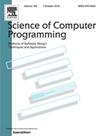基于能量时间自动机的安全无限资源调度
IF 1.4
4区 计算机科学
Q3 COMPUTER SCIENCE, SOFTWARE ENGINEERING
引用次数: 0
摘要
研究了具有多个连续资源的资源依赖实时系统的无穷安全调度的存在性。具体来说,我们探讨了能量时间自动机的多变量扩展,其中变量由Rn中的多面体限定。我们提出了是否存在满足这种边界约束的无限运行的问题,并展示了如何利用线性实数算法的量词消去将这些运行表征为极限集来合成调度。我们证明了对于线性极限集,有可能描述这样的无限运行。此外,我们将此与先前关于平面分段单变量能量时间自动机的可判定性结果联系起来,并建设性地表明存在平面和分段多变量能量时间自动机,它们会产生非线性极限集。最后,我们通过一个案例研究来巩固我们的框架和方法。具体来说,是一个涉及油罐的工业案例的多代理扩展,最初由HYDAC公司提供。本文章由计算机程序翻译,如有差异,请以英文原文为准。
Safe and infinite resource scheduling using energy timed automata
We study the existence of infinite and safe schedules for resource-dependent real-time systems, in the setting of multiple continuous resources. Specifically, we explore the multi-variable extension of Energy Timed Automata, where variables are bounded by polyhedra in . We ask the question of whether there exist infinite runs satisfying such boundary constraints and show how schedules can be synthesized by characterising these runs as limit sets using quantifier elimination for linear real arithmetic. We show that for linear limit sets, it is possible to characterise such infinite runs.
Additionally, we relate this to an earlier decidability result for single-variable Energy Timed Automata that are flat and segmented, and show constructively that there exist flat and segmented multi-variable Energy Timed Automata that give rise to non-linear limit sets.
Lastly, we solidify our framework and method with a case study. Specifically, a multi-agent extension of an industrial case concerned with oil tanks, originally provided by the HYDAC company.
求助全文
通过发布文献求助,成功后即可免费获取论文全文。
去求助
来源期刊

Science of Computer Programming
工程技术-计算机:软件工程
CiteScore
3.80
自引率
0.00%
发文量
76
审稿时长
67 days
期刊介绍:
Science of Computer Programming is dedicated to the distribution of research results in the areas of software systems development, use and maintenance, including the software aspects of hardware design.
The journal has a wide scope ranging from the many facets of methodological foundations to the details of technical issues andthe aspects of industrial practice.
The subjects of interest to SCP cover the entire spectrum of methods for the entire life cycle of software systems, including
• Requirements, specification, design, validation, verification, coding, testing, maintenance, metrics and renovation of software;
• Design, implementation and evaluation of programming languages;
• Programming environments, development tools, visualisation and animation;
• Management of the development process;
• Human factors in software, software for social interaction, software for social computing;
• Cyber physical systems, and software for the interaction between the physical and the machine;
• Software aspects of infrastructure services, system administration, and network management.
 求助内容:
求助内容: 应助结果提醒方式:
应助结果提醒方式:


